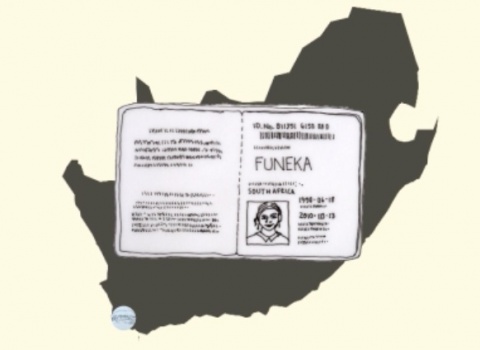
Inspired by the National Planning Commission’s story of Thandi, which Trevor Manuel told as a way to depict the key challenges facing the country, IkamvaYouth has launched Funeka’s Story, which explains IkamvaYouth model and its impact, and sends out a call for volunteers and supporters.
[video:http://youtu.be/NEFflXglk28 align:center]
A BIG UP THANK YOU to:
* Funeka, for sharing your story and being such a professional voice-over artist!
* Capitec for availing Funeka during work hours to go to the sound studio
* Dan Eppel who recorded and mixed the sound
* Freshly Ground for donating the tunes
* the staff and interns who helped behind the scenes,
and especially to:
* Lynne Stuart (@ideainaforest) for applying her design talents to explain what we do so concisely and beautifully!

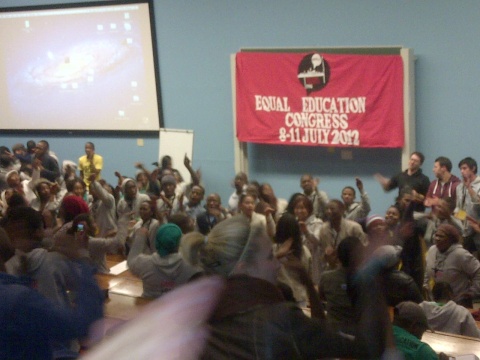

On the 7th of July 2012, I took a trip to the Equal Education Congress of 2012. The trip was fully funded by Equal Education (Many Thanks for the opportunity). It would be a very interesting 5 days for me. From the viewpoint of an outsider, the congress would be more of a learning experience more than anything.
Arriving on Sunday, the team was introduced to us and registration took place. The registration and off to Thembisa for the opening event, where we were welcomed by Archbishop Thabo Makgoba. After that we heard an address by Cosatu member Zwelinzima Vavi, who showed his support for the movement of Equal Education. Also on the speakers line up were equaliser (the title given to schoolgoing members) Khutso Mmapheto, and Equal Education Coordinator Doron Isaacs. After the event we boarded buses headed to UJ Aukland par campus where we would spend the the next 5 days.
Monday morning was cold in JHB, but maybe it was just the Durban in me. Breakfast was served in the dining hall, as would be the case for the rest of the week. The morning started with a plenary session on youth and politics globally. Mr Rob Peterson spoke about the Arab spring ( The revolutionary wave of demonstrations and protests occurring in the Arab world that began on 18 December 2010) . I found this very intersting. How an uprising in one country can spark fury in neighbouring contries with the same conditions. After tea the session continued with more guest speakers of note. The likes of Barbara Hogan and Vuyiseka Dubula-Majola graced the podium. After lunch, the congress was then split into groups.
Each group comprised about 30 members. These would be our groups for the duration. We spent the rest of the afternoon discussing how Equal Education can penetrate more in the community and find a more efficient way forward.
On Tuesday, delegates were divided into six groups and had an opportunity to attend some really cool educational tours. I had an opportunity to visit the constitutional court, which was an amazing experience for me. I had never been to a real court before, let alone South Africas highest court. We took a tour around the entire court, and Justice Edwin Cameron graced us with his presence, briefing us of what the court does and how it works. We were then transported to Soweto, where we would spend the rest of the evening. The equalisers then discussed what kind of leadership they wanted to lead the new Equal Education. Following the discussion, it was time to meet the candidates. The candidates then introduced themselves and this was followed by a voting process.
Wednesday saw more plenary discussions around the challenges in education. Guest speakers of the likes of Nic Spaull and Veronica Mashiyi (parent) graced the podium. Further discussions around issues such as what is an EE member, and the life cycle of an EE member where discussed in groups. Further discussions of the way forward took place in the group session. Later that evening after a short break, the new Leadership was then announced, the constitution was finalised and the congress was then brought a formal close.
Thursday was the big day, the day we would march for our education in the streets of Tembisa. The day started out like every other day. Cold due to the weather, fired up from the spirit of the equaliser. Buses lined up, food packages and equalisers chanting songs of Marching. The busses headed to Tembisa and when we got there, it was time to mobilise. The first order of business was to mobilise the community. I had the biggest challenge amongst my group, Language. I do not know any Sotho at all, and on that day, I felt it. But when the march began, I put on my marching boots. The route we took was the same route that the students of 1976 took. After the march we headed back to UJ for supper and a social event. The entertainment at the social event would be the last activity of the trip.
I wish Equal Education all the best in the future. In conclusion, this was a great opportunity for me to learn to learn from an organisation whose work is directly in line with what we do. Wishing Equal Education the best in their future.
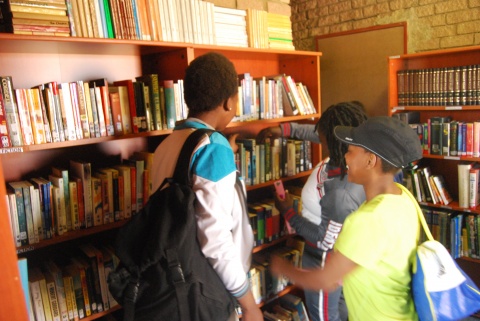
On Saturday, 25 August, Ikamva Youth’s Ebony Park Branch opened it’s own library. It was opened after a ceremony introducing the Ikamvanites to the library and its rules. After watching entertaining videos on the wonder of books, learners made their own bookmarks in anticipation of reading the library’s books. After the ceremony, excited Ikamvanites were allowed to go to the library. For the first time books were taken out of the newly established library. Hopefully this will expose them to the joys of books, establishing a culture of reading at the Ebony Park Branch.

(Ikamvanites deciding which books to take out from the library)
Just over a year ago, Ikamva volunteer Nthabiseng Mokoena realised that the Ikamvanites lacked access to books. After consulting with other volunteers at the Branch, as well as Ikamva employees, she decided to start a library. With a generous donation of book shelves from Robert Barkahuizen, the process of the forming the library began. Nthabiseng, and fellow volunteer Samuel Suttner, collected books from various sources, including family, friends, and fellow Wits’ students. There were considerable donations from Pat Tucker and from the Matla Runners, and assistance from Prof. Bhekizizwe Peterson and the Wits Volunteer Programme.
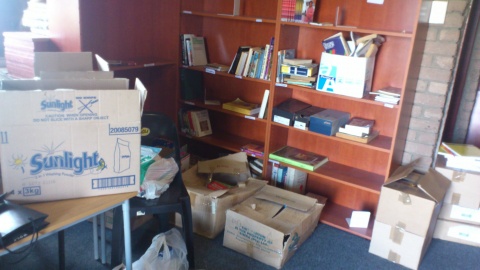
(The library, still a work in progress)
Once the books were collected, the arduous task of setting up a cataloguing system for the library began. With the help of a former librarian, Lucille Katz, and Lucy Verbeek, this was done over many months. They set out the library, categorising and cataloguing the many books
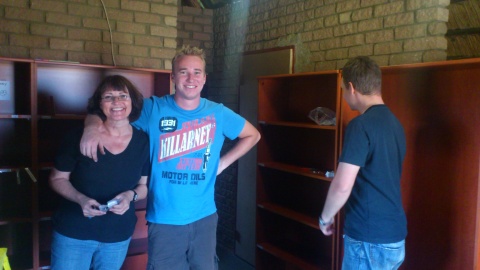
(Lucy Verbeek (left) and her son helping out with the library.)
There was no funding for the library; all the resources for it were donated by people who believed in the importance of having a library for the Ikamvanites. The views of those who assisted with the establishment of the library were expressed by the novelist Zadie Smith: “A lot of people don’t have books on their shelves. The library was the place I went to find out what there was to know. It was absolutely essential.”
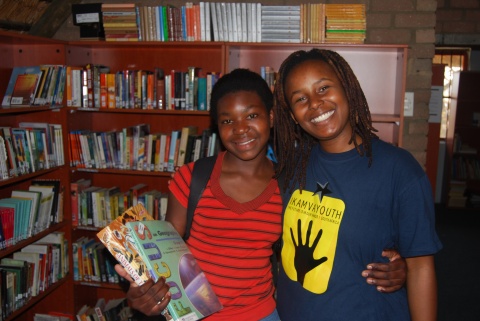
(An Ikamvanite takes out books, with volunteer Nthabiseng Mokoena – right).
We would like to thank the following people for their assistance:
Andrew Barrett; Hlengiwe Radebe; Judy Engela; Karuna Singh; Gill Laburn and the Matla Runners; Lucille Katz; Lucy Verbeek; Nyasha Mutasa; Pat Tucker; Patrick Zimba; Prof. Bhekizizwe Peterson; Robert Barkahuizen; Seth Musker; Stephanie Simpson; Talent Mzili; Thapelo Mokoena; Tiffany Ebrahim; Wits Volunteer Programme, Wits University; Wits Bachelor of Accounting Science, Fourth Year Class of 2012.
Written by Nthabiseng Mokoena and Samuel Suttner

(Listen to the actual debate at http://www.bbc.co.uk/radio/player/p00x8h4d)
Ikamvanites in Gauteng were invited to take part in the BBC Africa Debate at the University of the Witwatersrand on the 31st of August. The question posed was: South Africa at 18- Does black and white still matter in the rainbow nation? (Unfortunately, due to the nature of the topic and the manner in which BBC radio created the racial references, this article will also be using such terms.)
The debate was hosted by BBC radio presenters, Audrey Brown and Karen Allen, and a panel of speakers selected by BBC in an attempt to represent the “Born Free Generation” as people born on or post 1994. The panel was a strategized mix of Black and White persons from St Benedict’s Private School, Pretoria Boy’s High and Wits Students in an attempt to represent “all” youth. The audience consisted of political party representatives, organisations like Ikamva Youth and academics.
The panellists were divided both racially and with their opinions. However, their opinions were not divided according to race as predicted. Throughout the debate, depending on one’s personal background, circles of influence, experiences and current state of affairs, people felt and saw things differently.
Some youth stated that race does still matter and is still used as a form of identifying and relating to people – finding a commonness (based on cultural, linguistic and socio-economic) amongst a diversified crowd and finding it easier to socialise better with people who have the same social backgrounds. Is this based on the fear of rejection and the need for belonging that most humans feel? On the other hand, as highlighted by the presenters, race is possibly merely used as a code to cover up other issues, such as how race is experienced on a social level. It was great to see that after the debate, the IkamvaYouth learners, also Born Free, interacted with people outside of their normal circle – spreading their horizons.
Some of the issues raised involved nationalisation,education and poverty. A poll was raised and showed that the majority of the attendees were against nationalisation. In terms of the economy, some ‘Born Free’ learners argued that the need is for South Africa to focus on the mines and entrepreneurs to grow the national economy in order to develop society. The issue of shared wealth was then raised and with this race dimensions came up again. A majority of the audience share the view that the majority of poor people are black because the majority of South Africans are black and it is an underdeveloped country – hence the poverty. However, many still see it as: Black people are poor because they are black and financial status is a racial issue construed by the past racial injustices.
Most issues that were given attention were national issues. Policies of Apartheid reformation such as Affirmative Action, BEE and the Constitution were brought up and their role in healing the racial divide were questioned. Unemployment and access to equal opportunities is an evident issue that maintains the gap between the rich and poor. With statistics showing that South Africa has overtaken Brazil GINI ratio – wealthiest. White per capita is 8 times more than black per capita.
This shows that real issues facing South Africans are issues of inequality based on many issues with race only being a structural component created by history and inherently inherited.It was largely seen that differences in race still matters only because South Africans make it matter. All the views of participants were forcibly related to racialism and were rarely from a personal experience of injustice. It seems that society continues to insist on segregation economically, linguistically, geographically and ethnically. One of the audience members noted that: ‘the rainbow colours never mix’, maybe it is inherently human nature to distinguish through separation rather than taking advantage of differences to enhance the whole. There is a shared fear of being different because South Africans were once forced to be different based on race only. The question posed was: when will South Africans stop being forced as well as force ourselves to view one another as Black and White?
IkamvaYouth is at the core at tackling these issues and is a community that is aware, wants to be heard and has the power to make a greater change – The views many Ikamvanites have are from a personal and sincere point of view. These views matter and make issues and discussions more linked to the humaneness of the issues people face on their daily lives.

Ikamvanites, Speak Out! Only you can represent your views with the intensity that they should be viewed. If you feel strong about something – Shout!
Thank you IkamvaYouth for showing us that our voice matters!
Written by Kihisha Suleman (Volunteer in charge of Career Guidance at Ebony Park)
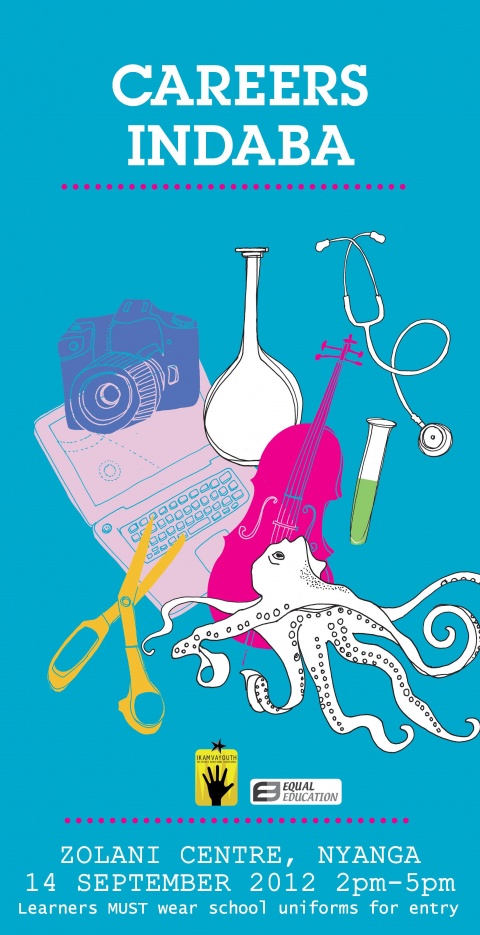
Do you know what you want to do after Matric?
This is a hard decision, one that requires a lot of information and careful consideration, but IkamvaYouth and Equal Education are here to help. We would like to invite you to our 2012 Careers Indaba.
Come join us on the 14 September 2012 in the Zolani Centre in Nyanga (across the road from the Nyanga bus and taxi rank), and is open to grades 8-12.
Address:
The Zolani Centre,
Sithandatu Avenue,
Nyanga
7750
Directions to Zolani Centre
From Cape Town city centre:
Get on to the N2 toward the Cape Town Airport and Somerset West.
At junction 18 take right on to Borcherds Quarry Road (signposted to Nyanga/M22)
Follow this road down to the T- junction at the taxi rank and take a left on to Sithandatu Avenue
The Zolani Centre is on your left immediately and you can turn into the car park straight after the first set of robots.
The purpose of the Careers Indaba is to expose you to new opportunities, provide information about various study options, learnerships and volunteer programs, resources and support structures. In addition the Careers Indaba will offer workshops on CV writing, interview techniques and personal development. These are skills you will need wherever your path takes you!
Why should I come?
Whether you want to continue your studies, start working; find out about on the job training these choices require information and planning. Alternatively do you want to apply for a volunteer program or internship? It is important to start investigating your options now. At the Careers Indaba you will be able to talk directly to the people who are there to guide you in the right direction.
What are my options?
1/ Continue your studies: Do you want to become a teacher, doctor, electrician, scientist, a lawyer, hairdresser, accountant or nurse? All these positions require you to study further. At the Careers Indaba you will be able to discuss your options for universities, colleges, and Further Education Training (FET colleges)
2/ Working & on-the-job training: Do you want to make your own way and be an entrepreneur? Find our what it involves running your own business or learn while working through learnership programmes. At the Careers Indaba you will be able to find out about these options.
3/Volunteering, Internships and Gap Year Programmes: Do you want to spend some time deciding what your next step is, or getting to know yourself and the world about you a little better? Do you want to give back to your community or volunteer and gain valuable experience in a specific field? The Careers Indaba will give you the opportunity to find out more about this.
Spread the word, looking forward to seeing you all there!

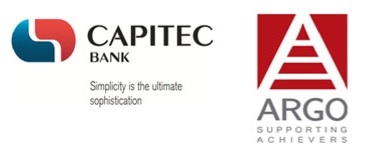
I was very honoured to be invited by Capitec Bank and Argo Publishers to participate in a panel discussion together with some amazing women who’re doing extraordinary work in education. On 4th July we met at the Sandton Convention centre to discuss how to really make a difference to the learners in our schools, by sharing, combining and collaborating across all the different systems to make a systemic impact. My fellow panelists were:
The minutes of our discussion are available here.

The conversation was a great opportunity to reflect on the power of collaboration, and to gain a better understanding of effective ways in which to collaborate. I shared some of the experiences IkamvaYouth and Capitec have had in working together towards common goals.
IkamvaYouth was initially entirely run and funded by volunteers, and then our early years were funded mostly by foundations; many of which continue to support our work years on. In the past 2-3 years, corporate south Africa has begun to take notice of our work, as the people who come through our program are the kinds of people they want to hire. In addition to being academic achievers, ikamvanites live the values of giving back/paying-it-forward, and have gained valuable work experience through being branchcom members.
These partnerships provide huge scope for innovative collaboration beyond funding, and in addition to multi-year financial support, Capitec is assisting IkamvaYouth in the following ways:
* Programme delivery
Capitec staff have enthusiastically become involved in working directly with our learners. During the recent winter schools, they held financial literacy training programmes for all the Western Cape branches, and will be participating in the upcoming Careers Indaba.
* Measuring impact
The realiability of learners’ school reports at some schools can be problematic, and accessing this data is often challenging (although it’s illegal to withhold school reports due to unpaid school fees, many schools continue to do so). It’s thus quite tricky to know how our learners are doing until they write the national exams. Capitec has stepped in to address this challenge by opening up the assessments they use for recruitment, which measure literacy, numeracy and problem-solving abilities.
* Enabling access to opportunities
Capitec has a progressive policy whereby they hire people from the communities where their branches are. As they’re bringing banking to under-served communities which are typically under-resourced, they’re struggling to find prospective employees who’re sufficiently numerate and literate.
One of our Makhaza tutors, Unathi Smile, wrote the Capitec assessments and made it all the way through to becoming recruited! Capitec has also awarded bursaries to cover grade 10s’ school fees at IkamvaYouth’s feeder schools.
* Infrastructure support
As Capitec upgrades its computer equipment, they’ve set about refurbishing and delivering them to IkamvaYouth branches to enable the establishment of new labs and expansion of existing ones.
* Strategic support:
Capitec has scaled a simple, smart solution to reach communities in need. Sbusiso Khumalo has joined IkamvaYouth’s board of directors, and is providing advice and guidance to enable us to scale and meet the demand for our services while still maintaining our track record of results.
These are just some of the examples where smart, easy collaboration leads to greatly enhanced reach and impact. The challenges presented by the crisis in education are far too large and looming for one organisation, company or even Government Department to overcome alone. A large-scale collaborative effort is called for, and IkamvaYouth is greatly appreciative of the combined efforts of our donors and partners which are making great strides and changing lives.











 Lloyd Lungu
Lloyd Lungu